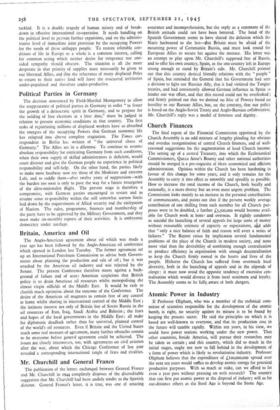Church Finances
The final report of the Financial Commission appointed by the Church Assembly is an odd mixture of lengthy pleading for obvious and overdue reorganisation of central Church finances, and of well- reasoned suggestions for the augmentation of local Church income. The setting up of a central Treasury, into which the Ecclesiastical Commissioners, Queen Anne's Bounty and other national authorities should be merged is a pre-requisite of More economical and efficient administration. Opinion within the Church has been hardening in favour of this change for some years; and it only remains, for the Assembly to carry it into effect as smoothly and speedily as possible. How to increase the total income of the Church, both locally and nationally, is a more thorny but an even more urgent problem. The Commission looks mainly to an increase in the personal contributions of communicants, and points out that if the present weekly average contribution of one shilling from each member for all Church pur- poses were to be doubled, a further £5,5oo,00o would become avail- able for Church work at honkt and overseas. It rightly condemns as suicidal the launching of several appeals for large sums of money without reasonable estimate of capacity or expectations, aid adds that "only a nice balance of faith and reason will avert a series of failures." The Report raises by implication several fundamental problems of the place of the Church in modern society, and none more vital than the desirability of combining enough centralisation to produce efficiency in organisation with enough decentralisation to keep the Church firmly rooted in the hearts and lives of the people. Hitherto the Church has suffered from overmuch local diversity, both in the launching of appeals and in the stipends of clergy: it must now avoid the opposite tendency of excessive cen- tralisation which would divorce it from local sentiment and loyalty. The Assembly seems to be fully, aware of both dangers.






















 Previous page
Previous page